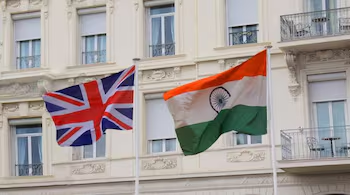The long-anticipated Free Trade Agreement (FTA) between India and the United Kingdom is set to provide a significant boost to India’s sustainable fashion sector. As negotiations near conclusion, industry leaders and policymakers alike are hailing the deal as a transformative opportunity for India’s textile and apparel industry—particularly in the realm of eco-conscious, ethically-produced clothing.
According to senior officials involved in the talks, the FTA includes preferential market access for sustainably certified textiles and garments, lower tariffs on organic and recycled materials, and joint innovation frameworks for green technology in fashion manufacturing.
Major Win for Indian Textile Exporters
India is already one of the world’s largest textile producers, but sustainable fashion has often remained a niche, premium segment. The trade deal with the UK—one of the world’s most eco-conscious fashion markets—is expected to change that.
Under the new agreement, Indian exporters will enjoy reduced or zero tariffs on garments and textiles that meet certain environmental standards, such as Global Organic Textile Standard (GOTS), Fair Trade, and OEKO-TEX certification. This is likely to encourage Indian manufacturers to invest further in sustainable materials, low-waste processes, and ethical labor practices.
The UK, in return, gets a more affordable and diversified supply of green fashion products, helping it meet its carbon neutrality goals and reduce dependence on fast fashion imports from less-regulated regions.
Opportunity for MSMEs and Artisans
The FTA also includes a dedicated framework for promoting small and medium enterprises (SMEs) and traditional Indian artisans involved in sustainable fashion. This includes subsidies for eco-friendly dyeing, packaging, and weaving techniques as well as simplified export norms.
Designers working with Khadi, organic cotton, bamboo fabric, and natural dyes are expected to benefit significantly. The deal supports initiatives to promote India’s handloom sector internationally while ensuring fair wages and environmentally sound production.
Several Indian brands that champion sustainable practices—such as those involved in slow fashion and circular economy models—are already preparing to scale up their operations to meet potential new UK demand.
Green Manufacturing Gets a Push
The trade pact comes with provisions for technological collaboration between Indian and British firms, especially in green chemistry, biodegradable textile treatment, and low-carbon supply chains. Indian garment hubs like Tiruppur, Surat, and Ludhiana are expected to undergo modernisation drives to align with new eco-compliance benchmarks.
Additionally, access to green financing and skill development support from UK partners is part of the broader vision to elevate India’s manufacturing base to global sustainable standards.
Boost to India’s Global Fashion Footprint
The India–UK FTA is more than just a tariff agreement—it represents a strategic alignment on sustainability in one of the most resource-intensive industries. Fashion brands in both countries are looking at co-branded initiatives, retail collaborations, and eco-themed fashion shows to showcase the creative and ecological strengths of Indo-British fashion.
Major UK retailers and platforms, including those in the luxury and ethical fashion space, are expected to onboard more Indian brands once the FTA is signed and implemented. E-commerce channels will play a key role in accelerating access.
The India–UK Free Trade Agreement is a milestone moment for India’s sustainable fashion movement. With the reduction in trade barriers, new funding avenues, and a growing global appetite for conscious clothing, Indian designers, exporters, and artisans are poised to lead the next wave of eco-fashion.



